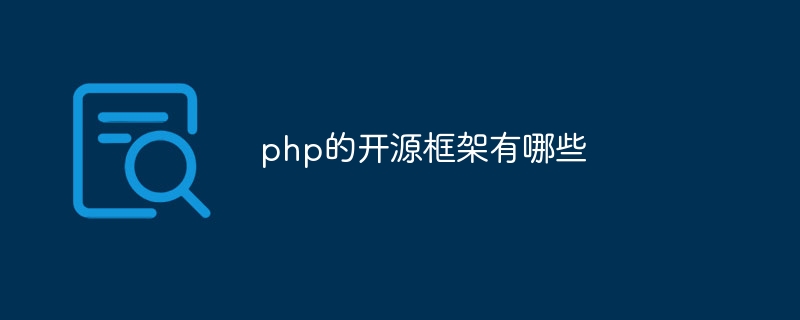
php’s open source frameworks include Laravel, Symfony, CodeIgniter, Yii, and Phalcon. Features and uses: 1. Laravel provides simple and elegant syntax and rich extension functions, allowing developers to quickly build high-quality Web Application; 2. Symfony provides powerful routing and cache management, form verification, security mechanism and other functions, and is highly configurable; 3. CodeIgniter provides a powerful database access abstraction layer, form verification, session management, etc.

The operating environment of this article: Windows 10 system, php8.1.3 version, dell g3 computer.
PHP (Hypertext Preprocessor) is a widely used open source server-side scripting language for developing dynamic web pages and web applications. PHP has many open source frameworks, which provide a wealth of tools and functions so that developers can build reliable web applications quickly and efficiently. This article will introduce several common PHP open source frameworks to help readers understand the characteristics and uses of the frameworks.
1. Laravel
Laravel is one of the most widely used PHP open source frameworks. It provides simple and elegant syntax and rich extension functions, allowing developers to quickly build high-quality web applications. Laravel supports important functions such as routing management, database migration, ORM (Object Relational Mapping), template engine, and email sending, and integrates tools such as security, debugging, and error handling. In addition, Laravel also provides a complete testing framework to simplify developers' testing work.
2. Symfony
Symfony is another popular PHP open source framework with solid infrastructure and large community support. Symfony's design philosophy is flexibility and reusability. Through its modular structure, developers can easily integrate and reuse different components. Symfony provides powerful routing and cache management, form validation, security mechanisms and other functions, and is highly configurable. Symfony's documentation and examples are extensive, and an active community continues to drive upgrades and improvements to the framework.
3. CodeIgniter
CodeIgniter is a lightweight PHP framework that is simple, fast and flexible. Compared with other frameworks, CodeIgniter has a lower learning curve, allowing beginners to get started faster. CodeIgniter provides a powerful database access abstraction layer, form validation, session management and other functions, and also supports template engines and database migration. The framework also offers excellent performance and is suitable for quickly building small to medium-sized web applications.
4. Yii
Yii is a high-performance PHP framework that is widely used to build large-scale web applications. Yii (short for "Yes It Is") is committed to providing a fast, efficient, secure and scalable development experience. Yii has powerful cache and database management, security and authentication, error handling and debugging capabilities. Moreover, it supports RESTful API development and microservices architecture. Yii's documentation and community are very active, with plenty of tutorials and sample code available.
5. Phalcon
Phalcon is a high-performance PHP framework written in C language, so it has better performance than other frameworks. Phalcon is a full-stack framework that includes routing, ORM, caching, form validation, and template engines. Although Phalcon has a relatively high learning curve, it provides developers with excellent performance and excellent flexibility.
Summary
PHP has many powerful open source frameworks, each with different features and uses. Laravel, Symfony, CodeIgniter, Yii, and Phalcon are all popular PHP frameworks, each with unique advantages and applicable scenarios. Depending on project needs and personal preferences, choosing the right framework can improve development efficiency and code quality. Understanding these common PHP open source frameworks can help developers make better decisions in web application development.
The above is the detailed content of What are the open source frameworks for php?. For more information, please follow other related articles on the PHP Chinese website!